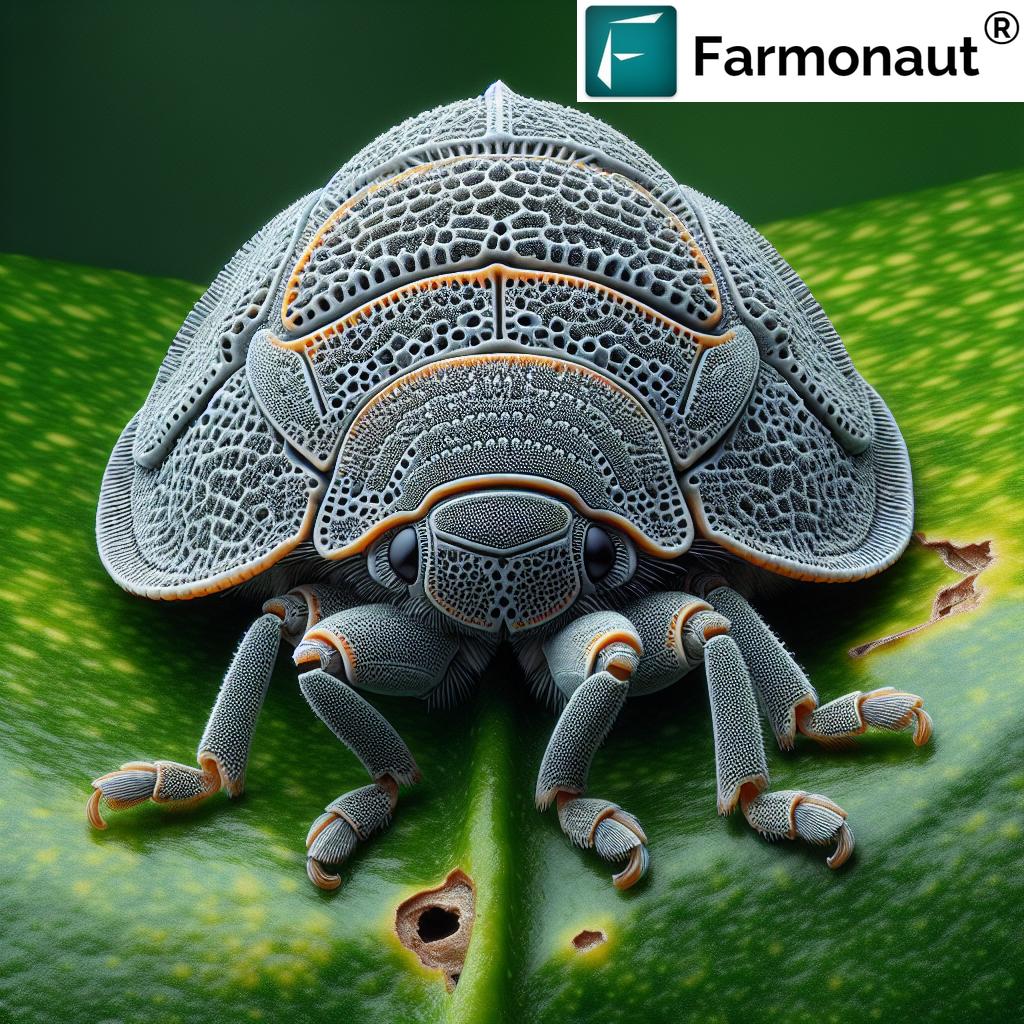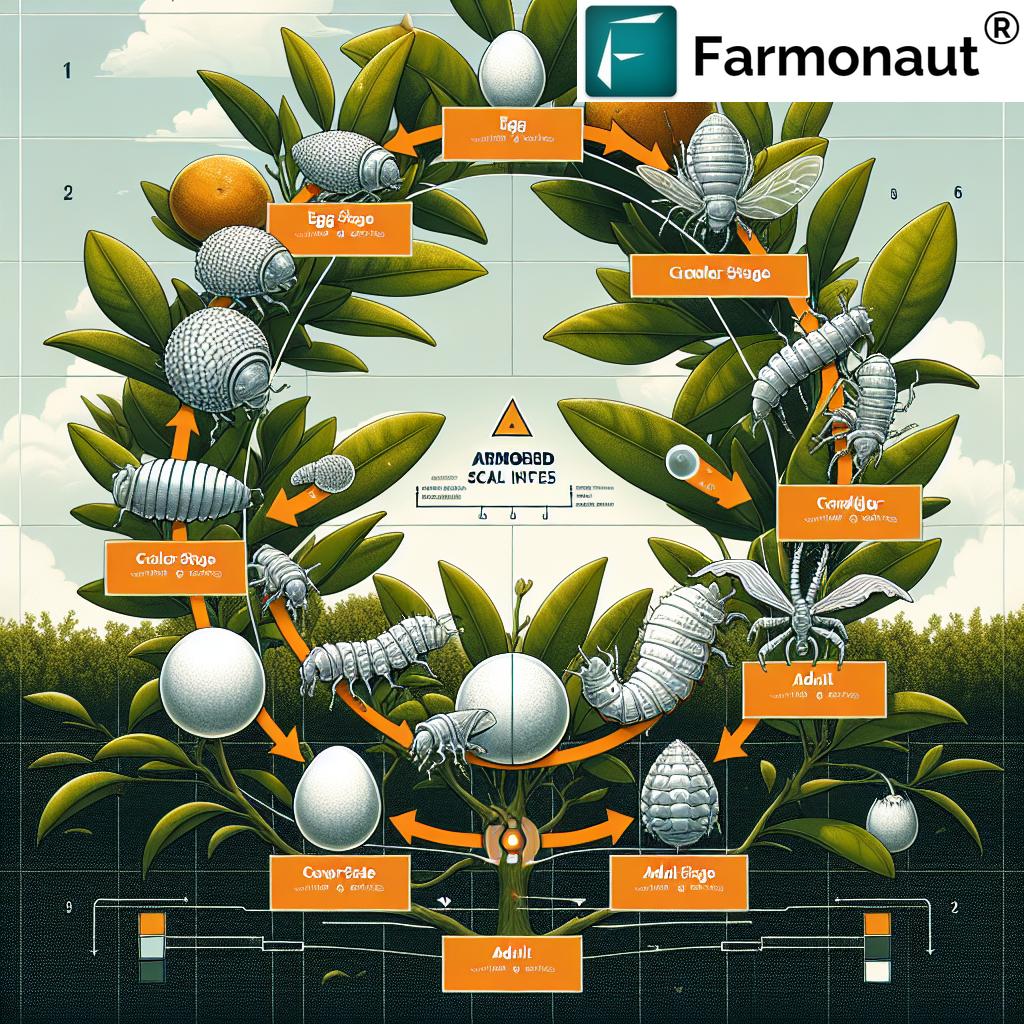
Effective Control of Armored Scale Insects: Protecting Citrus Plants from Egg to Shield
As agricultural technology experts at Farmonaut, we understand the critical importance of protecting citrus crops from harmful pests. One of the most persistent and damaging pests affecting citrus plants is the armored scale insect. In this comprehensive guide, we’ll explore the lifecycle of these pests, their impact on citrus crops, and effective control methods to safeguard your orchard.
Understanding Armored Scale Insects
Armored scale insects are small, sap-sucking pests that pose a significant threat to citrus plants. These insects derive their name from the hard, protective covering or “shield” that they develop as they mature. This shield makes them particularly challenging to control, as it protects them from many insecticides and natural predators.
The Lifecycle of Armored Scale Insects
To effectively control armored scale insects, it’s crucial to understand their lifecycle:
- Egg Stage: Female scales lay eggs beneath their protective covers.
- Crawler Stage: Upon hatching, tiny “crawlers” emerge and move to find feeding sites on the plant.
- Settling and Feeding: Crawlers settle on leaves, twigs, or fruits and begin feeding on plant sap.
- Shield Development: As they feed and mature, scales secrete a waxy covering that hardens into a protective shield.
Impact on Citrus Plants
Armored scale insects can cause significant damage to citrus plants in several ways:
- Sap Depletion: By feeding on plant sap, scales weaken the overall health of the plant.
- Leaf Damage: Heavy infestations can cause yellowing and premature leaf drop.
- Twig Dieback: Severe infestations can lead to the death of twigs and branches.
- Fruit Quality: Scales feeding on fruits can cause blemishes, reducing their marketability.
Detecting Armored Scale Infestations
Early detection is crucial for effective control of armored scale insects. At Farmonaut, we leverage advanced satellite technology to help citrus growers identify potential infestations before they become severe.
| Aspect | Traditional Scouting | Farmonaut’s Satellite-Based Monitoring |
|---|---|---|
| Detection Speed | Slow – Requires manual inspection of individual trees | Fast – Covers entire orchards in minutes |
| Accuracy | Moderate – Dependent on scout’s experience | High – Uses advanced algorithms to detect stress patterns |
| Coverage Area | Limited – Time-consuming for large orchards | Extensive – Can monitor thousands of acres simultaneously |
| Cost-Effectiveness | Low – Labor-intensive and time-consuming | High – Reduces labor costs and enables targeted treatments |
By utilizing our satellite-based monitoring system, citrus growers can detect early signs of stress in their orchards, which may indicate the presence of armored scale insects or other pests.
Effective Control Strategies
Controlling armored scale insects requires a multi-faceted approach. Here are some effective strategies we recommend:
1. Cultural Control
- Proper Plant Care: Maintain healthy citrus plants through proper irrigation and fertilization.
- Pruning: Remove heavily infested branches to prevent spread.
- Sanitation: Clean pruning tools between cuts to avoid spreading the pests.
2. Biological Control
Encourage natural predators of armored scale insects, such as:
- Parasitic wasps
- Ladybugs
- Lacewings
3. Chemical Control
When chemical control is necessary, consider the following options:
- Horticultural Oils: Effective against eggs and crawlers
- Insect Growth Regulators: Disrupt the molting process of scales
- Systemic Insecticides: For severe infestations
Note: Always follow label instructions and local regulations when applying pesticides.
Implementing an Integrated Pest Management (IPM) Approach
At Farmonaut, we advocate for an Integrated Pest Management (IPM) approach to control armored scale insects effectively. This strategy combines various control methods to minimize environmental impact while maximizing pest control efficacy.
Key Components of IPM for Armored Scale Control:
- Regular Monitoring: Use our Android or iOS apps to regularly monitor your orchards for signs of infestation.
- Threshold-Based Interventions: Only apply control measures when pest populations reach damaging levels.
- Combination of Control Methods: Integrate cultural, biological, and chemical control strategies as needed.
- Record Keeping: Maintain detailed records of pest populations, treatments, and their effectiveness.
Leveraging Technology for Enhanced Pest Management
At Farmonaut, we’re continually developing new technologies to assist citrus growers in managing pests like armored scale insects more effectively.
Satellite-Based Crop Health Monitoring
Our advanced satellite imagery technology allows growers to:
- Detect early signs of stress in citrus plants
- Identify potential hotspots of armored scale infestations
- Monitor the effectiveness of control measures over time
To learn more about our satellite-based monitoring services, visit our API documentation.
AI-Powered Advisory System
Our Jeevn AI system provides personalized recommendations for managing armored scale insects based on:
- Satellite imagery data
- Local weather conditions
- Historical pest patterns in your region
Case Study: Effective Armored Scale Control in a California Citrus Orchard
To illustrate the effectiveness of our integrated approach, let’s look at a hypothetical case study of a citrus orchard in California:
Scenario: A 100-acre lemon orchard was experiencing declining yields due to armored scale infestations.
Implementation:
- The grower subscribed to Farmonaut’s satellite monitoring service.
- Early detection of stress patterns indicated potential scale infestations in specific areas of the orchard.
- Targeted scouting confirmed the presence of armored scales.
- An IPM strategy was implemented, including:
- Release of parasitic wasps in affected areas
- Application of horticultural oils during the crawler stage
- Pruning of heavily infested branches
- Ongoing monitoring using Farmonaut’s technology tracked the effectiveness of control measures.
Results:
- 80% reduction in armored scale populations within one growing season
- 15% increase in marketable fruit yield
- 50% reduction in pesticide use compared to previous years
Best Practices for Long-Term Armored Scale Management
To ensure long-term success in managing armored scale insects in citrus orchards, consider the following best practices:
- Establish a Monitoring Routine: Regularly inspect your orchard using both traditional scouting methods and Farmonaut’s satellite monitoring technology.
- Promote Plant Health: Well-maintained citrus plants are more resistant to pest infestations. Ensure proper irrigation, fertilization, and pruning practices.
- Encourage Beneficial Insects: Create habitats for natural predators of armored scales by planting diverse vegetation around your orchard.
- Rotate Control Methods: To prevent pest resistance, alternate between different control strategies and chemical formulations when necessary.
- Stay Informed: Keep up-to-date with the latest research and recommendations for armored scale control in citrus orchards.
The Role of Weather in Armored Scale Management
Weather conditions play a crucial role in the lifecycle and control of armored scale insects. Our Satellite Weather API provides detailed weather data to help you make informed decisions about pest management.
Key Weather Factors Affecting Armored Scales:
- Temperature: Warmer temperatures accelerate scale development and reproduction.
- Humidity: High humidity can favor the survival of crawlers.
- Rainfall: Heavy rains can wash off crawlers and disrupt their settling process.
By integrating weather data into your pest management strategy, you can:
- Time insecticide applications more effectively
- Predict periods of high pest activity
- Adjust cultural practices to minimize pest-favorable conditions
The Future of Armored Scale Control in Citrus Orchards
As technology continues to advance, we at Farmonaut are committed to developing innovative solutions for pest management in citrus orchards. Some exciting developments on the horizon include:
- Hyperspectral Imaging: More precise detection of pest-induced stress in plants
- IoT Sensors: Real-time monitoring of orchard conditions to predict pest outbreaks
- Machine Learning Algorithms: Improved accuracy in identifying and predicting pest hotspots
By staying at the forefront of agricultural technology, we aim to provide citrus growers with the most effective tools for managing armored scale insects and other pests.
Conclusion
Effective control of armored scale insects is crucial for maintaining healthy and productive citrus orchards. By combining traditional pest management techniques with advanced technologies like Farmonaut’s satellite monitoring and AI advisory systems, growers can significantly improve their ability to detect, prevent, and control these persistent pests.
Remember, successful pest management is an ongoing process that requires vigilance, adaptability, and a willingness to embrace new technologies and methods. By staying informed and leveraging the latest advancements in agricultural technology, you can protect your citrus plants from egg to shield, ensuring bountiful harvests for years to come.
FAQs
Q: How often should I monitor my citrus orchard for armored scale insects?
A: We recommend weekly visual inspections during the growing season, complemented by regular satellite monitoring using Farmonaut’s technology.
Q: Are organic control methods effective against armored scales?
A: Yes, organic methods such as horticultural oils and encouraging natural predators can be effective, especially when combined with good cultural practices.
Q: Can armored scales develop resistance to insecticides?
A: Yes, which is why we recommend rotating between different control methods and chemical formulations as part of an IPM strategy.
Q: How does Farmonaut’s satellite monitoring detect armored scale infestations?
A: Our technology detects subtle changes in plant health and stress patterns that may indicate the presence of pests like armored scales.
Q: Is it possible to completely eradicate armored scales from my orchard?
A: Complete eradication is challenging. The goal is to manage populations below economically damaging levels through consistent, integrated pest management practices.

Ready to take your citrus pest management to the next level? Subscribe to Farmonaut’s advanced monitoring and advisory services: